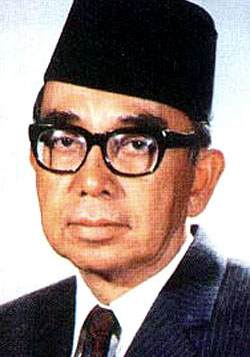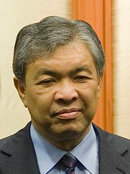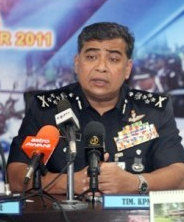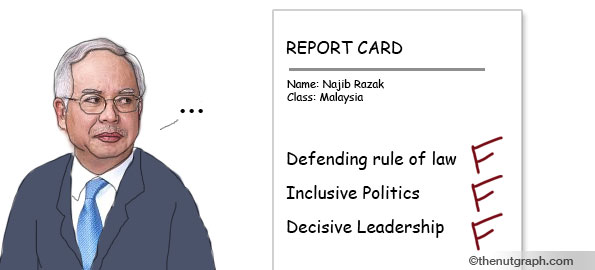
ON Father’s Day recently, Datuk Seri Najib Razak posted on his Facebook: “I won’t be the person I am today if it wasn’t for my father.” Najib’s father, as we know, was Malaysia’s second premier Tun Abdul Razak Hussein.
Najib’s remark was meant as a tribute to his dad. But was it really a tribute when Najib, through his choices and lack of leadership, is making Malaysia a worse place than when his father was prime minister?
How has Najib let the nation down? And how will Malaysia end up paying for his ineffectual and short-sighted leadership?
Cabinet
As the prime minister, who is also the head of cabinet, what kind of ministers has Najib appointed and retained? Looking at just two senior ministers, we can see how Najib and his administration are redefining Malaysia, undermining the rule of law and thereby contributing to making Malaysia a worse place.

On 16 June 2014, Minister in the Prime Minister’s Department Datuk Seri Jamil Khir Baharom told Parliament that Malaysia was not a secular state.
Jamil’s statement, in a Parliamentary reply no less, flies in the face of the nation’s history. Indeed, MCA has vociferously criticised Jamil for his remarks, describing them as “inaccurate, incorrect and flawed”.
The Barisan Nasional component party is not wrong in describing Jamil in those terms. There is enough historical documentation that proves Malaysia was founded as a secular nation. These include the 1957 Reid Commission’s report; the statements by previous prime ministers including Malaysia’s first prime minister, Tunku Abdul Rahman; and a 1988 Supreme Court ruling in the case of Che Omar bin Che Soh v Public Prosecutor.
Jamil is entitled to his opinion as a private citizen. However, Malaysia was intended to be a secular state. It was founded as such when Malaya gained independence in 1957 and later on in 1963 when Malaysia was formed. If Malaysia is no longer a secular state, as a minister, Jamil must explain what happened in between then and now. He needs to answer the question, “What means did citizens use to consent to a change that resulted in Malaysia ceasing to be a secular state?” Merely declaring that it happened doesn’t make it a reality, even though I suspect that is what Jamil and others like him who are in power, want to have happen.
That’s not the only misrepresentation Jamil has made in Parliament. Jamil has also declared that the constitution allows for unilateral conversion of minors to Islam even though the cabinet disagrees. The Bar Council has also pointed out that Jamil’s statement is erroneous and that it misrepresented a Federal Court decision.

Another Cabinet minister using the position of his public office to redefine what this country is about and how it should be governed is Home Minister Datuk Seri Zahid Hamidi. His Parliamentary response that no crime was committed when the threat to slap Member of Parliament (MP) Teresa Kok was made, is another instance of willful misinformation and dereliction of public duty.
The Penal Code‘s section 506 definitely cites criminal intimidation as an offence that is punishable by a fine, a jail sentence or both. And yet, the Home Minister, who is in charge of public security, is demonstrating ignorance about the laws of the land. Either that or he is deliberately redefining what constitutes a crime because in this case, it is an Opposition MP who has been targeted for her criticisms against the government.
Both Jamil and Zahid are clearly unread or willfully and wrongly attempting to change the way Malaysia is governed through their actions as ministers. And yet, neither has been reprimanded by their boss, Najib. In fact, in any other responsible and credible organisation or government, the likes of Jamil and Zahid would already have been removed from office.
By remaining silent and not taking action, Najib is in fact endorsing the actions of both ministers. He is, in effect, saying that he agrees that a minister in his department can rewrite Malaysian history and unilaterally declare that the federal constitution is no longer supreme. And Najib is also declaring, by his inaction over Zahid, that a Home Minister can willy-nilly dictate what the Penal Code’s provisions mean.
The police

Najib has also demonstrated either an inability or unwillingness to act against the police chief for so publicly revolting against the judicial branch of government. Inspector-General of Police (IGP) Tan Sri Khalid Abu Bakar has refused to enforce the High Court rulings in the M Indira Gandhi and S Deepa custody battles. Not only that, the IGP has proposed instead that the High Court rulings be set aside and Indira and Deepa’s affected children placed under the Welfare Department’s care.
When the IGP will not enforce a civilian court ruling that specifically directs the force to enforce the law, that is nothing short of mutiny. And when that happens, unless the government wants lawlessness to prevail, the police chief must be immediately censured and sacked.
That hasn’t happened. What has happened instead is that the Home Minister has refused to comment on Khalid’s recalcitrance. At the same time, Najib decided to give Khalid a way out when he suggested that custody battles should be settled by the Federal Court.
Gabungan Bertindak Malaysia (GBM), a coalition of civil society organisations, has rightfully taken the prime minister to task for what he has done. Najib’s action is contemptuous of all civil courts other than the Federal Court. It also encourages disobedience in the nation’s security forces. If that wasn’t bad enough, the Cabinet has backed Najib’s proposal.
Umno
Najib hasn’t just failed as a prime minister in defending the rule of law. He has also failed in maintaining control over his party as Umno president. Because Umno is the most dominant party in the ruling coalition, what Najib says or does, or doesn’t say or do, has ramifications for the nation.

Najib has done nothing as party chief to publicly reprimand the Umno members who violently stormed the Penang state assembly on 21 May 2014 to demand that DAP assemblyperson RSN Rayer apologise for calling Umno “celaka”. Najib remained quiet after Umno thugs threatened to burn down the DAP headquarters in Kuala Lumpur over the same reason. And he did nothing to publicly sanction the Umno Youth chief Khairy Jamaluddin for refusing to apologise for the Youth members’ criminal behaviour.
In effect, Najib is telling Umno members that if they break the law and resort to gangsterism, even against the highest legislative body in a state, that’s OK by the party. Umno will not initiate any reprimand or penalty.
Consequences
None of the immediate and foreseeable consequences of Najib’s actions or inaction make Malaysia a safer, better governed or more just nation where citizens can rely on the state to uphold the rule of law.

Instead, Najib’s leadership encourages and endorses ignorance in his cabinet, divisive politics that undermine Malaysia’s very foundation, irresponsible and criminal actions, and a determined disrespect for the law. That’s right; ignorance, divisive politics, criminal actions and disrespect for the law — that’s what Najib’s leadership has brought about.
And if that’s the kind of leadership he practises, is he really paying tribute or insulting his father for attributing who he is to his dad? More importantly, doesn’t Malaysia deserve so much better than a prime minister like Najib? ![]()
Jacqueline Ann Surin isn’t surprised that Prime Minister Najib Razak only has a 7.3% attendance rate in Parliament since taking office in April 2009. She wants a prime minister who will uphold the rule of law and the supremacy of the federal constitution.


Sunna Sutta says
@Jacqueline
An excellent appraisal of Najib’s negative record as PM which will eventually go down in history as a damning legacy!
If I may add further, silence does not mean merely consent. Cabinet consensus is the practice of democratic governments. In this respect, a cabinet minister only voices out what has been unanimously agreed by the cabinet which is headed by the Prime Minister. Any cabinet minister who steps out of line is either sacked by the Prime Minister or somehow be put into a position where he or she has no other choice but to resign as in the case of Waytha Moorthy. In the final instance, the voice of a minister represents the collective voice of the cabinet, the “loudest” of which is the Prime Minister’s.
Far from a helpless and neutral bystander as well as a weak leader at the mercy of ministers and heads of departments in the civil service who speak in the same way […], the silence of the Prime Minister is damning evidence that he is the foremost protagonist in the demolition of the rule of law and the sovereignty of the federal constitution.
Adam says
Najib’s failure is mainly due to his inability to speak and act without fear and favor. He has many skeletons in his closet such that he could be held to ransom by those in the know. I am sure the AG, the MACC and the police have details of some of his secrets and as such, he could not act as he should against those for fear of them spilling the beans.
Another example is, if my boss were to instruct me to sort out a problem at all cost and in the process, I accidentally kill someone, my boss has to protect me and his boss, who has given him the same instructions, has to protect him. It is all down the line. Everyone is having a hold on the other. That is the sad story of Malaysia now.